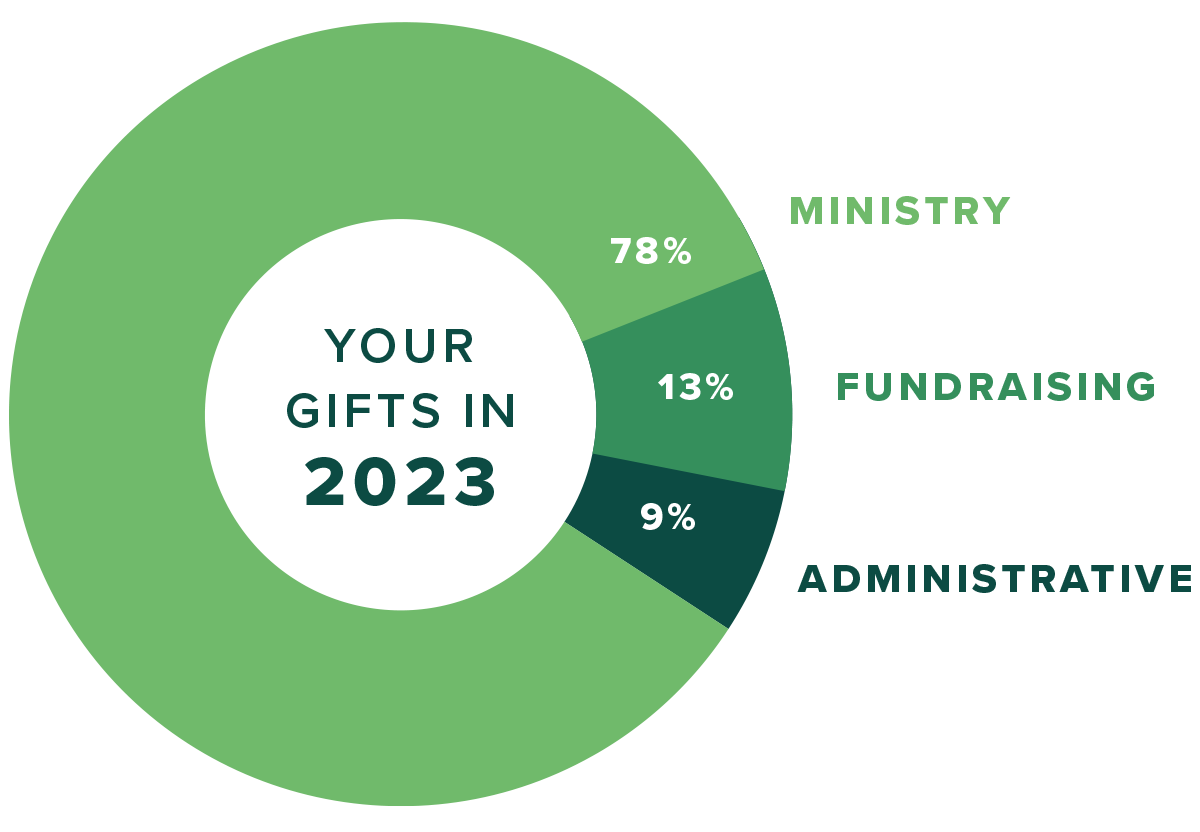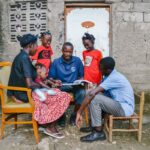Persistent Child Champion Helps
A little boy is rescued from the ravages of malnutrition thanks to his loving but very impoverished grandmother and a Child Champion’s intervention.
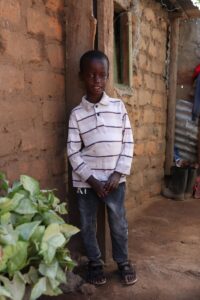
Jackson was rescued from malnutrition thanks to his grandmother and his Child Champion.
“He is doing great! He has grown taller and is learning how to speak. Last week, he attempted to say the name ‘teacher’,” says Child Champion Evelyn Reson at PEFA Kimana Hope Center in Kimana, Kenya.
She was describing the progress made by a little boy named Jackson, who not so long ago couldn’t walk, talk, hold up his head, or eat on his own because he was so malnourished.
First Encounter With Jackson
I first met Jackson on Nov. 12, 2021, on a hot, sunny, and dusty day when his grandmother, Nkinyi Nalena, brought him in for registration at the Hope Center.
Over 200 parents had brought their kids with the hope that they would get a chance to register them, yet only 110 spots were available. The highest priority was given to the kids with the most urgent needs, like Jackson.
My role was taking photos of the kids as they were being registered.
When Jackson, 7, and his grandma found their way to the photo section, I tried taking a photo of the boy. But I couldn’t get him to look into the camera or stand up straight.
He was a little bent over, with his head facing down. An effort to try having him stand straight on his own bore no fruit, so I asked his grandmother to step into the photo and hold him.
I later inquired if he had any disabilities, but his grandmother assured me that he had none and was in perfect shape. After the photo session, Jackson’s grandmother carried him on her back as they headed home.
Of all the kids registered that day, I thought that there was something unique about Jackson and his grandmother.
Jackson continued to tug at my heartstrings, and a year later, I wanted to know how he and his family were doing and what their story was.
Supportive Child Champion
So I met up with Reson at the Hope Center to have a chat about Jackson before we headed to his home.
“There has been real transformation since he joined,” says Reson, “And each day, there’s something new I notice about him. From being unable to feed himself, to being carried by his grandmother to the center, he is now an independent boy and has a very beautiful smile.”
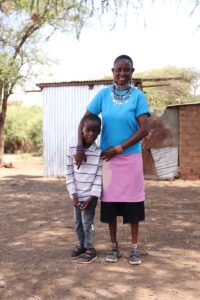
Jackson with Nkinyi.
As we arrive at the home, Jackson spots Reson from the gate and smiles widely before trying to hide his face with his little hands and then runs to try to hide behind a short wall.
He giggles and peeps to look at us as we draw closer to their doorstep.
Reson calls out his name and his face lights up further as he comes to greet us, bending his head and waiting for us to touch his head in a traditional Maasai greeting.
We find his grandmother, Nkinyi, cleaning the house as she was preparing to host a group of her friends. Her daughters-in-law together with some neighbors are helping her prepare food for the guests.
As we sit down under a tree to have a conversation, Nkinyi points out how Reson has played a significant role in supporting her and her family.
“You are like family. I deeply appreciate how you come to check up on the boy and on us, how you advise and follow up to know how he is at home,” she tells Reson.
For the past year, Reson has made a deliberate effort to drop by Jackson’s house frequently to check on him.
Secretly Troubled Household
We start our conversation over a cup of tea Nkinyi offers us, and I ask her to help me understand why Jackson was unable to stand straight for a photo on the day of registration.
She dates his struggles back to when Jackson was 4.
At that time, Jackson and his four siblings lived with their parents less than half a mile away from Nkinyi’s home. Unbeknown to Nkinyi, her daughter’s marriage was on the rocks, and she suspected she was slowly falling into depression.
Nkinyi, 57, says, her daughter, Jackson’s mom, didn’t tell anyone about her troubled marriage. And as she struggled to balance taking care of Jackson’s youngest sibling, who was a newborn at the time, and dealing with the trouble between her and her husband, things grew worse.
Nkinyi says she later found out that the husband was not only making the marriage difficult, but he had also stopped providing for his family and was relying on Jackson’s mom to do casual-labor jobs to earn an income.
With all the challenges her daughter faced, Nkinyi says, she wasn’t able to feed her children regularly, and Jackson was the most affected because he was a toddler at the time.
Unfortunately, Jackson’s mom died shortly after Nkinyi learned about her troubles, and Nkinyi took her grandchildren in because their father had abandoned them.
Saved Just in Time
During the burial of Nkinyi’s daughter, she realized that little Jackson could not walk or eat properly. She also realized that in addition to being underweight, he couldn’t hold his head up, and it kept toppling forward as if it were too heavy.
Nkinyi knew something was wrong, but she just wasn’t sure what it was.
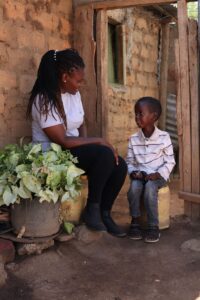
Child Champion Reson visits with Jackson,
At that time, she worked in a nearby dispensary as a cleaner. One day, as she went to work, she took Jackson to the doctor.
The doctor told her that Jackson was not disabled but was suffering from severe malnutrition.
“I at first felt bad that my daughter never told me about her challenges,” Nkinyi says. “I would have preferred to care for all the kids as she solved her marital issues, but I believe everything happens for a reason.”
Medicine was prescribed for Jackson, and he was also registered into a program that provided free nutritious porridge flour for underweight or malnourished kids.
At home, Nkinyi made sure he took his meds on time and would religiously go for a refill of the meds and the porridge flour whenever they ran out.
She had a lot on her mind.
“I wondered how I would balance taking care of Jackson, who was unwell, and his younger brother, who was a baby and needed my attention.”
But Nkinyi was hopeful that her grandson would be well one day because the doctor had assured her that he would be.
However, her greatest challenge was that she wasn’t able to afford food for the five new members of her household. Child hunger was a very real threat.
She earned the equivalent of $45 monthly from cleaning at the hospital. The money was not enough to buy food, school supplies, and pay hospital bills, which were her most urgent needs.
As she wondered how she would manage all the needs at home, she received a call from one of her friends who informed her of the registration at the Hope Center.
“My friend had told me that Jackson would benefit from the program that was being set up at PEFA church,” she says. “I didn’t know what the program was all about. All I knew was that I needed my grandson to get help.”
Help and Hope for Jackson
When Jackson began attending the center, Nkinyi visited the office and talked to Reson about the challenges they faced at home.
Reson told Nkinyi that together they would find solutions to these challenges.
The first thing Reson and other Child Champions addressed was Jackson’s health.
“When we realized he was responding well to the meds he had, we had to support his grandma,” Reason says. “We ensured that for Jackson’s sake and for all kids, the porridge we cooked as a morning snack at the center was nutritious.”
Healthful porridge is still given to all kids there.
They started by helping serve the porridge to Jackson because he couldn’t hold a cup steadily, and then they transitioned to allowing him to be first in line as the kids queued up for porridge. Currently, he queues up like all the kids because he is stronger.
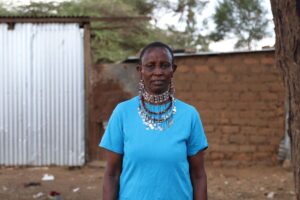
Nkinyi is grateful for all of the support her grandchild, Jackson, has received at his Hope Center.
At home, his grandma enforces the routine by ensuring that he carries his own plate of food and feeds himself as opposed to them feeding him.
Jackson initially used to watch other kids play interesting games, but his Child Champions slowly urged him to play and encouraged the other kids to cheer him on. Now he looks forward to playtime at the Hope Center.
Jackson also used to spend very little time in class because he couldn’t concentrate, but he now stays through the whole class.
He no longer is carried on his grandmother’s back when they go somewhere, and he now runs and walks. Jackson is also learning how to talk.
“I am happy to see him happy. It is even more exciting to hear him say some words,” Nkinyi says. “No matter how inaudible he is, my heart rejoices that my daughter’s child is back to life.”
Flourishing With Love and Care
Nkinyi’s hope for Jackson and his siblings is that they can get an education and prosper in life. She says she hopes to take them all to school because that is one thing she missed as a child.
When Nkinyi was a child, school was never a priority, and at 18, she was married off as a third wife to a man who was older than her father.
She says her father offered her hand in marriage to his friend as a gift to the friend. She could not refuse because in the Maasai culture, disobedience to parents was thought to attract curses.
So when she got married, she vowed that she would take all her children to school and never choose a husband for them.
Seven children later, Nkinyi has honored the promise she made as a girl. She is now also ensuring that all her grandkids get an education.
To the Hope Center and the Child Champions, she says, “I am so thankful that they are walking this journey with me. I love that Reson loves my grandchild so much, and I know they are helping me raise the boy.”
Reson’s prayer for Jackson and other kids in hard places is that they can have Child Champions like Nkinyi who love and care for them.
“We’ve not done much with Jackson — it is the love and care that we at the center and his grandma give to him,” Reson says. “Give love to anything and anyone in the world and see how they flourish.
“I hope that all champions and parents can give love to these kids and watch for the transformation.”
Give hope, love, and encouragement to a kid in a hard place, like Jackson, by sponsoring a child today.
We are accountable to the children we serve AND to our donors.
Our accountability to our donors is one of our highest priorities. Our goal is to use the funds entrusted to us as wise stewards. To do this requires continued monitoring of our fund distribution. OneChild is also a member in good standing with the Evangelical Council for Financial Accountability (ECFA)
